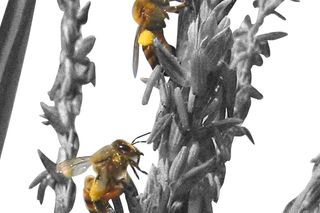
Air Pollution Is Impacting Health of India’s Bees, Wild Pollinators: Study
Wild pollinators play an important role in India’s plant biodiversity and agro-economy.

A new study on honeybees has found that these wild pollinators are living slower, sicker, shorter lives due to air pollution.
Published in Proceedings of the National Academy of Sciences, the four-year study of over 1,800 wild bees was conducted in Bangalore. Over the course of the study, giant Asian honeybees were observed and collected across four sites in the city, each with different levels of air pollution. At the end of the study, the researchers found that: first, the bees exhibited lower flower visitation rates in areas that were considered heavily polluted, than in less polluted areas; and second, the bees from more polluted areas had arrhythmic heartbeats and lower blood cell counts, and they also performed poorly in terms of immunity and metabolism, and exhibited signs of stress. To be doubly sure of their observations, and ascertain whether the impact of air pollution on the wild bees was species-specific, the researchers conducted a follow-up experiment by placing cages of fruit flies at the same sites where they had studied the wild bees — and they observed similar results.
Metals like lead, arsenic, tungsten, and aluminium, among others, were found on the bees collected from heavily polluted sites. “We examined their bodies inside and out. [It] was covered with all sorts of crud and particles. Its body looked like a warzone,” Geetha Thimmegowda, an ecologist at Bangalore’s National Center for Biological Sciences, who was involved in the study, said, commenting on bees from one of the sites.
Pollinators are an integral part of India’s agro-economy. For instance, the giant Asian honeybee used in the experiment produces over 80 percent of the country’s honey, and pollinates over 687 plants in Karnataka alone, according to the study. But ripples of air pollution’s impact on these creatures can also be felt worldwide — especially because India is among the largest fruit and vegetable producers in the world.
The Food and Agriculture Organization of the UN stated in a 2018 report that 75 percent of the world’s food-crops depend, at least in part, on pollination. The annual economic value of crops pollinated worldwide is estimated to be somewhere between USD 235 billion and USD 577 billion, according to data from 2015.
Related on The Swaddle:
City Lights Are Keeping Fireflies From Having Enough Sex to Avoid Extinction
According to the WHO, nine out of the 10 most polluted cities in the world are in India. Bangalore, where this study was conducted, is not even included in the top 10. And yet, its air was polluted enough for 80 percent of the bees collected from moderate and highly polluted sites in the city to have died within 24 hours. Given the importance of bees and other pollinators, not just to India’s biodiversity, but also to food security, the impact of air pollution on them is particularly concerning. And, “given the scale of landscape alteration and urbanization in India, it is expected that these effects are widespread and likely to worsen with time,” Dr. Hema Somanathan, who studies bee behaviour and pollination ecology at the Indian Institute of Science Education and Research, Thiruvananthapuram noted.
“[This] would have serious implications for agricultural output in India. Such findings further underscore the need to raise India’s ambient air quality standards,” Arunabha Ghosh, founder and CEO of the Council on Energy, Environment and Water, said.
The researchers blame rapid urbanization, intense agriculture, and poor emission control and enforcement, for this impact. But experts believe there are ways to address this. “Replacing cars with clean alternatives like electrified public transport would go a long way to reducing pollution. Creating more urban green spaces with lots of trees and other plants would help filter the air too, while providing new food sources and habitat for bees,” Barbara Smith, Associate Professor of Ecology at Coventry University, and Mark Brown, Professor of Evolutionary Ecology and Conservation at Royal Holloway, co-wrote in The Conversation, discussing the present study.
“Better application of research and evidence in development policy-making can save lives, reduce poverty, and improve quality of life… This (research) has far-reaching implications for the complex ecosystems we are part of, as these changes affect the quality of habitat and food sources we all depend on,” Shloka Nath, Executive Director at the India Climate Collaborative, who wasn’t one of the study authors, commented.
Devrupa Rakshit is an Associate Editor at The Swaddle. She is a lawyer by education, a poet by accident, a painter by shaukh, and autistic by birth. You can find her on Instagram @devruparakshit.
Related


Beluga Whales Enjoy Friendships and Social Networks, Just Like Humans
